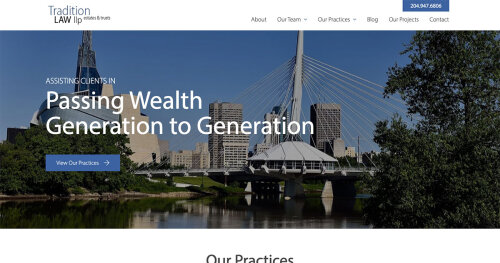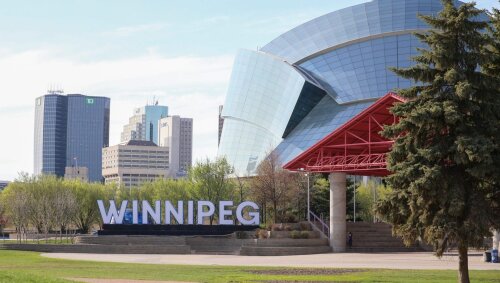Best Renewable & Alternative Energy Lawyers in Winnipeg
Share your needs with us, get contacted by law firms.
Free. Takes 2 min.
List of the best lawyers in Winnipeg, Canada
About Renewable & Alternative Energy Law in Winnipeg, Canada
Renewable and alternative energy law in Winnipeg, Manitoba, covers all legal aspects relating to the use, development, regulation, and promotion of energy sources that are alternatives to conventional fossil fuels. This includes solar, wind, hydroelectric, geothermal, and bioenergy. As interest grows in combating climate change and developing sustainable energy, the legal sector has had to adapt by implementing laws, incentives, and regulatory frameworks at both the provincial and municipal levels. Winnipeg, situated within Manitoba, benefits from the province's rich hydroelectric resources, but also sees growing investments in solar and wind energy. Understanding the relevant legal landscape is crucial for individuals, businesses, and organizations that want to engage in renewable and alternative energy projects.
Why You May Need a Lawyer
Individuals and businesses may require a lawyer experienced in renewable and alternative energy for a range of reasons. Some common situations include:
- Setting up a renewable energy project, such as installing solar panels on a commercial or residential property
- Applying for permits and navigating regulatory compliance
- Negotiating and drafting contracts for the sale or purchase of renewable energy
- Understanding your rights and legal obligations under local, provincial, and federal law
- Navigating disputes or litigating issues related to land use, environmental regulations, or contract performance
- Seeking financial incentives, grants, or rebates offered by government programs
- Managing the process of connecting your renewable energy system to the grid (net metering agreements)
- Advising on Indigenous land rights and consultation issues when projects impact traditional territories
- Acquisition, financing, and development of large-scale renewable energy projects
Given the complexity of regulations and the technical nature of energy law, consulting a legal professional ensures your project is compliant and protected.
Local Laws Overview
Renewable and alternative energy in Winnipeg is governed by a combination of municipal zoning bylaws, provincial legislation, and federal acts. A few key aspects include:
- Provincial Regulation: Manitoba's primary regulator of hydropower and energy utilities is the Manitoba Public Utilities Board. The province sets policies supporting renewables, such as the Manitoba Climate and Green Plan and net metering regulations, allowing residents and businesses to supply excess solar or wind energy back to the grid.
- City of Winnipeg Bylaws: The City regulates land use, permitting, and building codes for renewable energy installations. Home or business owners must comply with zoning standards and acquire necessary permits for solar panels or wind turbines.
- Federal Standards: The federal Canadian Environmental Assessment Act might apply to larger-scale projects, especially those with potential environmental impacts. Some federal funding and tax incentives may also be available.
- Environmental Protection: Any generation facility must adhere to environmental laws concerning emissions, wildlife habitats, and water use, especially in projects involving rivers or lakes.
- Grid Connection: Connection of renewable systems to Manitoba Hydro’s grid must meet technical standards and follow tariffs, agreements, and application processes set by the utility.
Frequently Asked Questions
What types of renewable energy are most common in Winnipeg?
Hydropower, solar, and wind energy are the most commonly used sources. Manitoba is known for its large hydroelectric resources, but solar panels and wind turbines are becoming more popular in Winnipeg.
Do I need a permit to install solar panels on my property?
Yes, you generally need a building permit from the City of Winnipeg before installing solar panels. Zoning, structural, and electrical requirements must be met.
Can I sell excess energy generated from my solar panels back to the grid?
Yes, Manitoba Hydro offers a net metering program that allows residential and commercial customers to supply surplus solar or wind energy to the grid and receive credits.
Are there government incentives or rebates for renewable energy in Winnipeg?
There may be provincial and federal incentives or funding available, such as grants or tax credits, but eligibility and program availability can change. It is important to check current offerings from Manitoba Hydro, the provincial government, and Natural Resources Canada.
What are the legal risks if I do not comply with local regulations?
Non-compliance can result in fines, stop work orders, or having to remove unpermitted installations. It may also impact insurance coverage and the value of your property.
Do I need to conduct an environmental assessment for my renewable energy project?
Smaller residential installations usually do not require a formal assessment, but larger projects or those affecting protected areas may require one under provincial or federal law.
How are Indigenous land rights considered in renewable energy projects?
Projects on or near Indigenous lands may require consultation with affected communities and could be subject to additional legal requirements or agreements.
Can businesses generate and sell renewable energy in Winnipeg?
Yes, businesses can develop renewable energy projects and may sell excess energy to Manitoba Hydro under specific agreements, subject to regulatory approval and compliance.
Are wind turbines allowed within Winnipeg city limits?
Wind turbines are subject to strict zoning rules and may not be allowed in all areas. Location, height, noise, and safety standards must be met.
How can a lawyer help with obtaining renewable energy project financing?
A lawyer can assist in reviewing financing options, negotiating loan or grant terms, and ensuring agreements comply with applicable regulations.
Additional Resources
The following local and governmental organizations can provide helpful information or support regarding renewable and alternative energy in Winnipeg:
- Manitoba Hydro - The provincial utility provides information on net metering, renewable energy connections, and efficiency programs.
- City of Winnipeg Planning, Property, and Development Department - Guidance on permits, zoning, and building requirements.
- Manitoba Sustainable Energy Association - Advocacy and educational materials about sustainable energy development in Manitoba.
- Natural Resources Canada - Offers information about federal programs and incentives for renewable energy.
- Environment and Climate Change Canada - Regulatory information related to environmental protection and assessments.
- Canadian Renewable Energy Association - Industry updates, best practices, and policy developments.
Next Steps
If you are considering a renewable or alternative energy project in Winnipeg, or need advice about legal rights and obligations, here are recommended next steps:
- Research your project type and check the City of Winnipeg and Manitoba Hydro websites for basic requirements and resources.
- Document your project plans, location, goals, and any correspondence you have already had with local authorities or utility providers.
- Contact a lawyer who specializes in energy, environmental, or construction law with experience in renewable and alternative energy. Bring your documentation to your consultation.
- Work with your lawyer to assess your eligibility for permits, incentives, and ensure compliance with all local, provincial, and federal laws.
- Monitor updates in legislation and available incentives, as policy and programs can change regularly.
Taking early legal advice can prevent costly errors, speed up your project’s implementation, and ensure your investment is protected. Professional guidance is recommended at each stage of development.
Lawzana helps you find the best lawyers and law firms in Winnipeg through a curated and pre-screened list of qualified legal professionals. Our platform offers rankings and detailed profiles of attorneys and law firms, allowing you to compare based on practice areas, including Renewable & Alternative Energy, experience, and client feedback.
Each profile includes a description of the firm's areas of practice, client reviews, team members and partners, year of establishment, spoken languages, office locations, contact information, social media presence, and any published articles or resources. Most firms on our platform speak English and are experienced in both local and international legal matters.
Get a quote from top-rated law firms in Winnipeg, Canada — quickly, securely, and without unnecessary hassle.
Disclaimer:
The information provided on this page is for general informational purposes only and does not constitute legal advice. While we strive to ensure the accuracy and relevance of the content, legal information may change over time, and interpretations of the law can vary. You should always consult with a qualified legal professional for advice specific to your situation.
We disclaim all liability for actions taken or not taken based on the content of this page. If you believe any information is incorrect or outdated, please contact us, and we will review and update it where appropriate.











